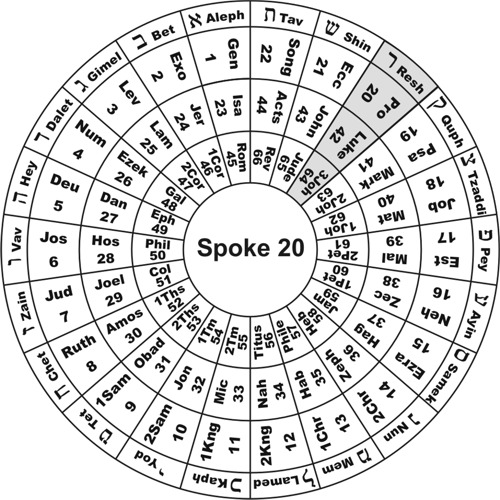3 John: A Prayer for Health and Prosperity
The elder unto the wellbeloved Gaius, whom I love in the truth.
Beloved, I wish above all things that thou mayest prosper and be in health,
even as thy soul prospereth.
3 John 1f (Spoke 20, Cycle 3)
This verse contains the only instance of the word health in the Epistles on Cycle 3,
and so it links directly to the primary Spoke 20 theme based on the Resh KeyWords ropheh (physician) and rapha (to heal)
discussed in the Great Physician aricle. In itself, this is a striking
"coincidence," especially in light of the brevity of John's Third Epistle which contains a mere fourteen verses.
Yet a much greater surprise arises when we examine the underlying text. The Greek verb translated
as be in health – hugiaino – is rare in the New Testament. It has two applications,
metaphorical (moral) and literal (physical). Paul used it in its moral sense in his pastoral Epistles
to Timothy and Titus when speaking of sound doctrine and sound faith. It appears elsewhere
only in Doctor Luke's Gospel, where he used it three times in reference to the wellbeing of
a physical body, twice in conjunction with the word sick:
- Luke 5:31 And Jesus answering said unto them, They that are whole need not a physician; but they that are sick.
- Luke 7:10 And they that were sent, returning to the house, found the servant whole that had been sick.
- Luke 15:27 And he said unto him, Thy brother is come; and thy father hath killed the fatted calf,
because he hath received him safe and sound.
 We have, therefore, a KeyLink between the opening passage of John's Third Epistle and three verses in
Luke based on the unique application of this Greek verb that is itself based on the primary theme of health
that dominates Spoke 20! This is the never-ending wonder of the Bible Wheel. There is simply no naturalistic
explanation for correlations like this that involve a coherent convergence of multiple lines originating in
completely independent sources like the order of the Christian Canon, the order of the Hebrew
Alphabet, and specific content of all the Books of the Bible (they are all involved in the KeyLink since
KeyLinks are defined as unique amongst all the Books of the entire Bible). We have, therefore, a KeyLink between the opening passage of John's Third Epistle and three verses in
Luke based on the unique application of this Greek verb that is itself based on the primary theme of health
that dominates Spoke 20! This is the never-ending wonder of the Bible Wheel. There is simply no naturalistic
explanation for correlations like this that involve a coherent convergence of multiple lines originating in
completely independent sources like the order of the Christian Canon, the order of the Hebrew
Alphabet, and specific content of all the Books of the Bible (they are all involved in the KeyLink since
KeyLinks are defined as unique amongst all the Books of the entire Bible).
|



